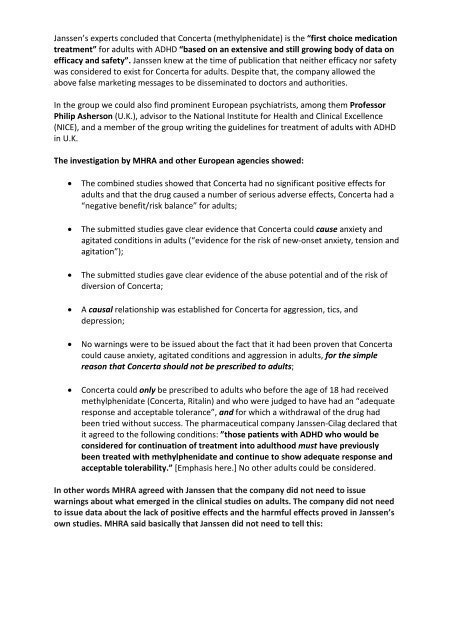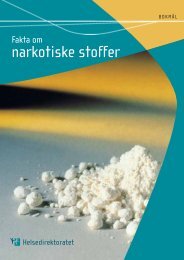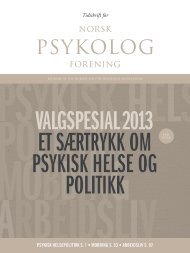ADHD drugs – MHRA and the Concerta scandal – an update
ConcertaMHRAOct2015
ConcertaMHRAOct2015
Create successful ePaper yourself
Turn your PDF publications into a flip-book with our unique Google optimized e-Paper software.
J<strong>an</strong>ssen’s experts concluded that <strong>Concerta</strong> (methylphenidate) is <strong>the</strong> “first choice medication<br />
treatment” for adults with <strong>ADHD</strong> “based on <strong>an</strong> extensive <strong><strong>an</strong>d</strong> still growing body of data on<br />
efficacy <strong><strong>an</strong>d</strong> safety”. J<strong>an</strong>ssen knew at <strong>the</strong> time of publication that nei<strong>the</strong>r efficacy nor safety<br />
was considered to exist for <strong>Concerta</strong> for adults. Despite that, <strong>the</strong> comp<strong>an</strong>y allowed <strong>the</strong><br />
above false marketing messages to be disseminated to doctors <strong><strong>an</strong>d</strong> authorities.<br />
In <strong>the</strong> group we could also find prominent Europe<strong>an</strong> psychiatrists, among <strong>the</strong>m Professor<br />
Philip Asherson (U.K.), advisor to <strong>the</strong> National Institute for Health <strong><strong>an</strong>d</strong> Clinical Excellence<br />
(NICE), <strong><strong>an</strong>d</strong> a member of <strong>the</strong> group writing <strong>the</strong> guidelines for treatment of adults with <strong>ADHD</strong><br />
in U.K.<br />
The investigation by <strong>MHRA</strong> <strong><strong>an</strong>d</strong> o<strong>the</strong>r Europe<strong>an</strong> agencies showed:<br />
• The combined studies showed that <strong>Concerta</strong> had no signific<strong>an</strong>t positive effects for<br />
adults <strong><strong>an</strong>d</strong> that <strong>the</strong> drug caused a number of serious adverse effects, <strong>Concerta</strong> had a<br />
“negative benefit/risk bal<strong>an</strong>ce” for adults;<br />
• The submitted studies gave clear evidence that <strong>Concerta</strong> could cause <strong>an</strong>xiety <strong><strong>an</strong>d</strong><br />
agitated conditions in adults (“evidence for <strong>the</strong> risk of new-onset <strong>an</strong>xiety, tension <strong><strong>an</strong>d</strong><br />
agitation”);<br />
• The submitted studies gave clear evidence of <strong>the</strong> abuse potential <strong><strong>an</strong>d</strong> of <strong>the</strong> risk of<br />
diversion of <strong>Concerta</strong>;<br />
• A causal relationship was established for <strong>Concerta</strong> for aggression, tics, <strong><strong>an</strong>d</strong><br />
depression;<br />
• No warnings were to be issued about <strong>the</strong> fact that it had been proven that <strong>Concerta</strong><br />
could cause <strong>an</strong>xiety, agitated conditions <strong><strong>an</strong>d</strong> aggression in adults, for <strong>the</strong> simple<br />
reason that <strong>Concerta</strong> should not be prescribed to adults;<br />
• <strong>Concerta</strong> could only be prescribed to adults who before <strong>the</strong> age of 18 had received<br />
methylphenidate (<strong>Concerta</strong>, Ritalin) <strong><strong>an</strong>d</strong> who were judged to have had <strong>an</strong> “adequate<br />
response <strong><strong>an</strong>d</strong> acceptable toler<strong>an</strong>ce”, <strong><strong>an</strong>d</strong> for which a withdrawal of <strong>the</strong> drug had<br />
been tried without success. The pharmaceutical comp<strong>an</strong>y J<strong>an</strong>ssen-Cilag declared that<br />
it agreed to <strong>the</strong> following conditions: ”those patients with <strong>ADHD</strong> who would be<br />
considered for continuation of treatment into adulthood must have previously<br />
been treated with methylphenidate <strong><strong>an</strong>d</strong> continue to show adequate response <strong><strong>an</strong>d</strong><br />
acceptable tolerability.” [Emphasis here.] No o<strong>the</strong>r adults could be considered.<br />
In o<strong>the</strong>r words <strong>MHRA</strong> agreed with J<strong>an</strong>ssen that <strong>the</strong> comp<strong>an</strong>y did not need to issue<br />
warnings about what emerged in <strong>the</strong> clinical studies on adults. The comp<strong>an</strong>y did not need<br />
to issue data about <strong>the</strong> lack of positive effects <strong><strong>an</strong>d</strong> <strong>the</strong> harmful effects proved in J<strong>an</strong>ssen’s<br />
own studies. <strong>MHRA</strong> said basically that J<strong>an</strong>ssen did not need to tell this:




